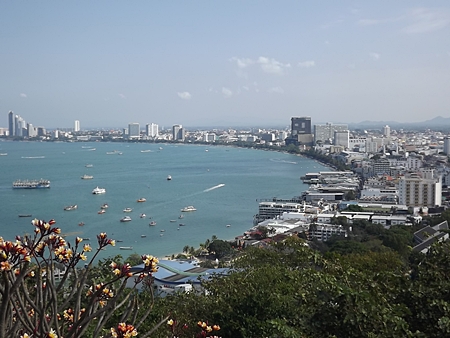Government stokes nationalist ire, but called inaccurate, xenophobic
Large-scale foreign ownership of land in Pattaya is not affecting the city’s development plans, Mayor Itthiphol Kunplome.
Downplaying a much-disputed claim by Thailand’s Office of the Ombudsman that a third of Thailand’s land is owned by foreigners – including 30 percent of Pattaya – Itthiphol said local government oversight and land laws have to date been effective checks against the use of Thai spouses and nominees to buy land and that foreign investment actually has helped grow the city.
 Pattaya City is experiencing accelerated growth and development.
Pattaya City is experiencing accelerated growth and development.
“There are many nominee companies, but the Chonburi, Pattaya and district administrative organizations and other agencies are cooperating to keep a diligent eye on things and place a lot of importance on this issue,” the mayor said. “There are both benefits and downsides to the situation, with the benefits being that foreign investment has been an important part of increasing the city’s economic value. But it does affect Thai people’s feelings about the country’s stability.”
Itthiphol’s comments came after Ombudsman Sriracha Charoenpanij, speaking at a March 12 hearing by the Senate Committee on Economic, Commercial and Industrial Affairs in Parliament, cited a National Institute of Development Administration study that claimed wealthy foreigners are using marriages to Thai women or nominees to buy prized properties, particularly in well-known beach resort towns.
The explosive allegation that 100 million rai of Thai land was being held in foreign hands thanks to legal loopholes and corruption set off both a wave of nationalist rhetoric and scathing criticism of the ombudsman’s loosely sourced facts. Real estate analysts called the figures “impossible” and newspaper editorialists blasted Sriracha’s claim as a “classic case of xenophobia based on false statistics.”
Nonetheless, the ombudsman said his office would be preparing new legislation to crack down on nominee company land holdings. Pattaya’s mayor, however, seemed unconcerned.
“The important thing to remember is that the local administrative office has management responsibilities over all land and monitors corruption or threats to the traditional way of life for local people, which has not been affected or threatened by the issue,” Itthiphol said.
He acknowledged that local Thais may have been alarmed by the ombudsman’s claim 30 percent of Pattaya’s land is held by foreigners, but “local development and plans are not affected in any way.”
“I believe that there are laws that will govern and protect any wrongdoings or any illegalities and if any law is found to be ineffective, the government will consider modifications,” he said.




